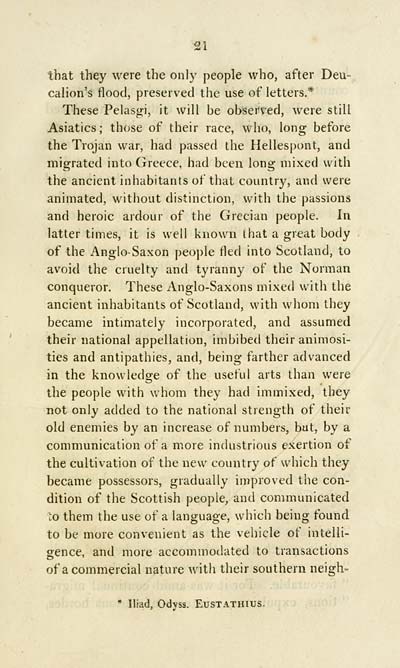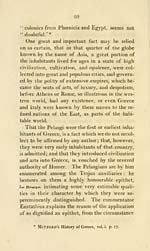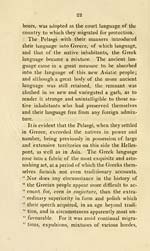Download files
Complete book:
Individual page:
Thumbnail gallery: Grid view | List view

■21
that they were the only people who, after Deu-
calion's flood, preserved the use of letters,*
These Pelaso^i, it will he observed, were still
Asiatics; those of their race, who, long before
the Trojan war, had passed the Hellespont, and
migrated into Greece, had been long mixed with
the ancient inhabitants of that country, and were
animated, without distinction, with the passions
and heroic ardour of the Grecian people. In
latter times, it is well known that a great body
of the Anglo-Saxon people fled into Scotland, to
avoid the cruelty and tyranny of the Norman
conqueror. These Anglo-Saxons mixed with the
ancient inhabitants of Scotland, with whom they
became intimately incorporated, and assumed
their national appellation, imbibed their animosi-
ties and antipathies, and, being farther advanced
in the knowledge of the useful arts than were
the people with whom they had immixed, they
not only added to the national strength of their
old enemies by an increase of numbers, but, by a
communication of a niore industrious exertion of
the cultivation of the new country of which they
became possessors, gradually improved the con-
dition of the Scottish people, and communicated
^o them the use of a language, which being found
to be more convenient as the vehicle of intelli-
gence, and more accommodated to transactions
of a commercial nature with their southern neigh-
* Iliad, Odyss. Eust.^thius,
that they were the only people who, after Deu-
calion's flood, preserved the use of letters,*
These Pelaso^i, it will he observed, were still
Asiatics; those of their race, who, long before
the Trojan war, had passed the Hellespont, and
migrated into Greece, had been long mixed with
the ancient inhabitants of that country, and were
animated, without distinction, with the passions
and heroic ardour of the Grecian people. In
latter times, it is well known that a great body
of the Anglo-Saxon people fled into Scotland, to
avoid the cruelty and tyranny of the Norman
conqueror. These Anglo-Saxons mixed with the
ancient inhabitants of Scotland, with whom they
became intimately incorporated, and assumed
their national appellation, imbibed their animosi-
ties and antipathies, and, being farther advanced
in the knowledge of the useful arts than were
the people with whom they had immixed, they
not only added to the national strength of their
old enemies by an increase of numbers, but, by a
communication of a niore industrious exertion of
the cultivation of the new country of which they
became possessors, gradually improved the con-
dition of the Scottish people, and communicated
^o them the use of a language, which being found
to be more convenient as the vehicle of intelli-
gence, and more accommodated to transactions
of a commercial nature with their southern neigh-
* Iliad, Odyss. Eust.^thius,
Set display mode to: Large image | Transcription
Images and transcriptions on this page, including medium image downloads, may be used under the Creative Commons Attribution 4.0 International Licence unless otherwise stated. ![]()
| Early Gaelic Book Collections > Ossian Collection > Thoughts on the origin and descent of the Gael > (33) |
|---|
| Permanent URL | https://digital.nls.uk/82234840 |
|---|
| Description | Selected books from the Ossian Collection of 327 volumes, originally assembled by J. Norman Methven of Perth. Different editions and translations of James MacPherson's epic poem 'Ossian', some with a map of the 'Kingdom of Connor'. Also secondary material relating to Ossianic poetry and the Ossian controversy. |
|---|
| Description | Selected items from five 'Special and Named Printed Collections'. Includes books in Gaelic and other Celtic languages, works about the Gaels, their languages, literature, culture and history. |
|---|

